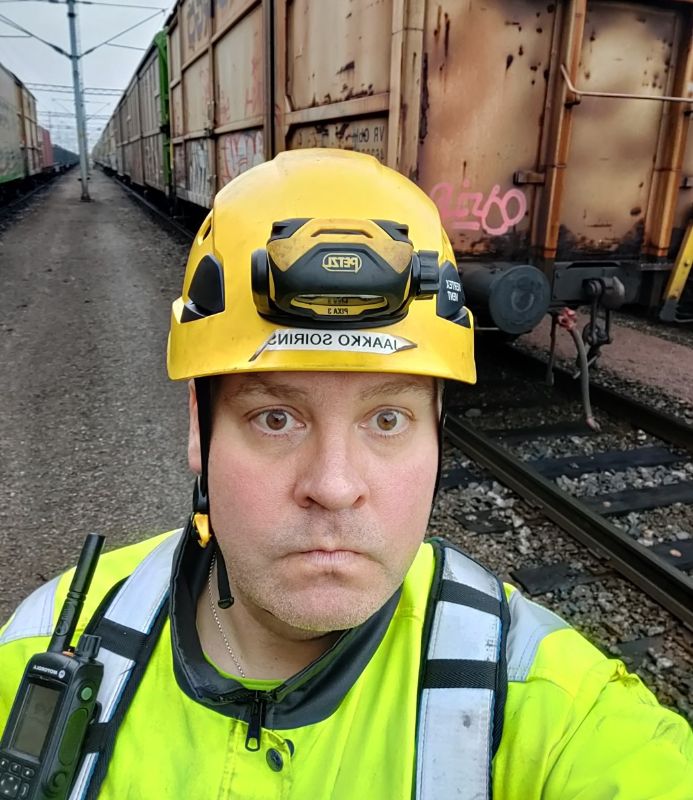Rail yard worker
"I like being a rail yard worker because we work in a regulated working environment. Everyone knows what to do because we have clear instructions for our work. Everyone also follows those instructions, because safety is the basis of everything we do. I enjoy this kind of work because I am precise by nature. On the other hand, I like the freedom and the fact that I am responsible for my work. I feel that there are more upsides than downsides to outdoor work."

- Jaakko Soirinsuo
- Rail yard worker at VR Transpoint.
- Completed a conductor course organised by the employer and later a training programme for rail yard workers organised by Kouvola Railway and Adult Education.
- 1.5 years of work experience in the field.
Briefly explain what you do for a living.
I work as a rail yard worker with VR. My duties are related to the reception and reorganisation of train freight wagons in the railway yard. A rail yard worker unlinks the freight wagons of incoming trains and assembles outgoing wagons into freight trains.
How have you ended up in the profession of your choice?
After upper secondary school, I had no clear plan for the future. I tried out different jobs, but nothing caught my attention. My mother had seen in the newspaper that VR was looking for new employees. I applied to be a conductor, but in the long run, I felt that the constant customer service was too much for me. The commute was also long because the trains departed from Helsinki. I still liked VR as an employer, and a new opportunity opened up when they were looking for rail yard workers through internal recruitment. I was fascinated by the idea that you get to conduct a locomotive if you are a rail yard worker.
Describe your typical working day or week.
When I arrive at the Kouvola railway yard, I use my mobile phone to log the start of my workday. I change into antistatic work clothes and safety shoes and put on the necessary protective equipment. Rail yard workers move cargo containing dangerous substances, so you need to have your protective equipment in order. Rail yard workers have many different duties in the railway yard. After putting on my gear, I head for the job I have been assigned that day.
That job could for example be the reception of freight wagons, pushing wagons with a diesel locomotive on an incline to sort them towards new tracks, braking the wagons on the incline or linking up wagons into new trains. Each railway yard has its own training for workers, and each task has its own orientation. During my shift, I work together with the other rail yard workers. If someone is on sick leave, I might go to another job in the middle of the day.
What kind of work environment or working hours do you have?
My work environment is the railway yard. It is outdoor work where you have to walk a lot. The work of a rail yard worker is irregular three-shift work, and you can be on shift on any day of the week. The length of a typical workday is eight hours. The compensation for night work is that your working hours rack up quicker if you do night shifts.
What kind of competence or qualities are required in the profession?
A rail yard worker has to be systematic, calm and attentive. You also have to be able to communicate clearly. Most of the communication happens in the official Virve network. Since we work with large masses and cargoes containing dangerous substances, communicating over walkie-talkies requires sufficient Finnish skills, the ability to express distances and give clear warnings of potentially dangerous situations.
You cannot rush railway yard work, and you always have to stay on track of what is going to happen next. You also have to be able to estimate how the seasons will impact the progress of work. For example, you need to know how a rail made slippery by frost affects how a wagon moves. You also need to be in good health and physically fit and have good vision and hearing for this job.
What is the best thing about your profession?
I like being a rail yard worker because we work in a regulated working environment. Everyone knows what to do because we have clear instructions for our work. Everyone also follows those instructions, because safety is the basis of everything we do. I enjoy this kind of work because I am precise by nature. On the other hand, I like the freedom and the fact that I am responsible for my work. I feel that there are more upsides than downsides to outdoor work.
What are the downsides of the profession or what seems challenging?
There are both downsides and upsides to outdoor and shift work. Working in bad weather is harder.
What would you tell a person considering the profession of a rail yard worker?
A rail yard worker has to somewhat plan their live around their shifts. You cannot come to work tired, because you have a lot of responsibility. You have to know how to take care of yourself. Of course, there is zero tolerance for alcohol, but you should know that there are regular random checks for alcohol in this work. This is the perfect profession for a person who enjoys being precise and working outdoors and who is even a little bit interested in railways and logistics.
How do you see the future of your profession?
Rail transport is affected by economic cycles and major changes, such as the forest industry being slow or the Russian attack in Ukraine. On the other hand, the railway is a relatively climate-friendly way of transporting large quantities of goods. In that sense, I am very confident that there will be work in the future as well.
